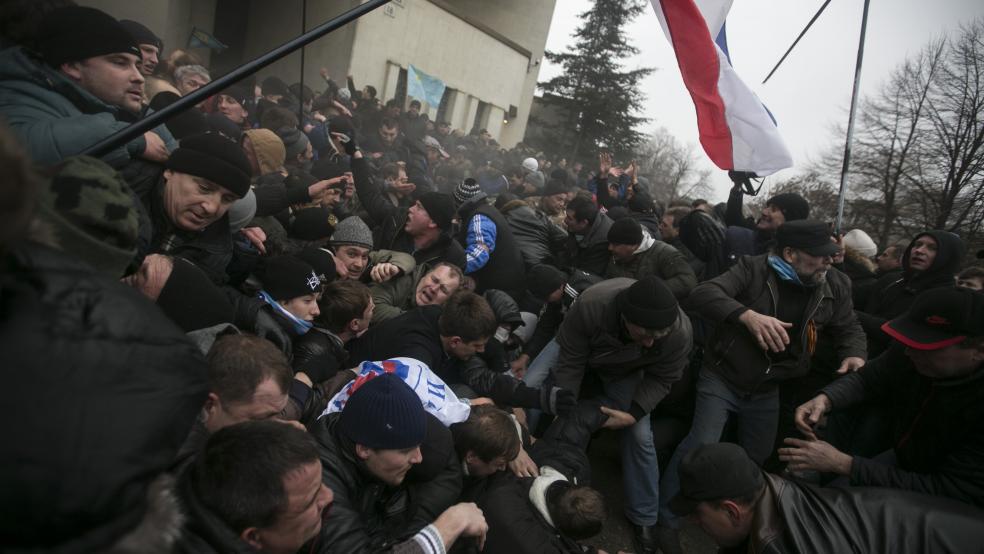The first shots in what many fear may be a war between Russia and Ukraine were fired Sunday, as Ukrainian troops moved against pro-Russian separatists in eastern Ukraine who had occupied government buildings there last week.
The fighting was part of an anti-terror operation launched by Ukraine. The goal of the campaign is to retake control of the country’s east, while sending a message of deterrence to Russia.
Related: Pressure on Putin as Russian Wealth Disappears
“The blood of Ukrainian heroes has been shed in a war which the Russian Federation is waging against Ukraine,” President Oleksandr Turchynov said in an address to Ukrainians Sunday evening. “The aggressor has not stopped and is continuing to sow disorder in the east of the country.”
However, few believe the mission, successful or not, will do little to deter Russia. If anything, it is likely to have the opposite effect: Moscow now has an excuse to start a wider conflict. Russians troops along Ukraine’s border show no signs of leaving, and Russian President Vladimir Putin has done little to suggest that Russia’s ambitions stop at Crimea.
The west also seems to have conceded that there is little it can do to stop Russia. The United States and Europe have issued economic sanctions against Russia, which have taken a serious toll on the Russian economy. The U.S. Ambassador to the United Nations Samantha Power promised more, targeting Russia’s energy, mining and banking industries Sunday.
“It has all the tell-tale signs of what we saw in Crimea,” Power told ABC News Sunday, referring to the actions of pro-Russian protestors in eastern Ukraine. “It's professional, it's coordinated. There's nothing grass roots seeming about it… And if actions like the kind that we've seen over the last few days continue, you're going to see a ramping up of those sanctions.”
Related: Russia’s Move in Crimea Sends China a Dangerous Message
NATO commanders are also acknowledging that Russia is likely to invade Ukraine. However, there is little agreement on how to proceed.
There is even debate from within the White House and the military on how to proceed. Gen. Phillip Breedlove, an American and the top-ranking military commander in Brussels, told Congress last month that the United States had to do more to check Russian aggression in Ukraine. However, the Obama administration wants to limit NATO’s actions to counter Russia to economic sanctions, which they hope will eventually strangle the Russian economy.
Most of Europe favors an economic approach as well. However, there is dissent from former Soviet bloc countries like the Czech Republic, who want a more forceful military response.
"If Russia decides to extend its territorial expansion to eastern Ukraine, the fun is over," Czech Republic President Milos Zeman said last week.” In that case, I would promote not only the toughest EU sanctions possible, but also let's say military readiness on the part of NATO, for instance with its troops entering the Ukrainian territory.”
Related: How Putin Awoke NATO’s Sleeping Giant
Because Ukraine isn’t a part of the alliance, the response favored by the Czechs is not likely. However, the alliance needs to deter Russia from invading former Soviet states that are members and have historic ties to Russia, like Albania and Lithuania.
NATO has been deterring Russia in two keys ways. They are:
1. Show force in Baltic States that are NATO members. The alliance began this process last week, announcing that it would triple the number of fighter jets in Lithuania fro 4 to 12. These plans are expected to start to fly sorties over the old Soviet bloc next month. They are also sending war ships to the Black Sea. The alliance is also considering deploying troops to member nations in Eastern Europe.
Navy Colonel Steven Warren said that the buildup was meant to “reassure NATO allies and Black Sea partners…It demonstrates our commitment to our … allies to enhance security, readiness and capabilities,” he said.
2. Continue a media blitz to pressure Russia to back down. Even some of Russia’s closet allies, including China, have condemned Moscow from taking Crimea. As Russia has become more ambitious, NATO has been engaged in a media blitz aimed at tarnishing Russia even further.
Related: Why Germany and Poland Are Winners in the Ukraine Crisis
Last week, NATO released satellite images obtained by a private intelligence satellite, a bizarre revelation of importance when tensions between Russia and the alliance run high. Breedlove went as far as to comment on the photo, Tweeting, “Russian forces around Ukraine fully equipped/capable to invade. Public denial undermines progress. Images tell story.”
NATO Secretary General Anders Fogh Rasmussen, who flooded international airwaves last week, repeatedly delivering the same message, joined Breedlove with a simple message: Russia has no plans to stop at Crimea.
Russian troops are “ready for combat …. We have seen the satellite images day after day. Russia is stirring up ethnic tensions in eastern Ukraine and provoking unrest. And Russia is using its military might to dictate that Ukraine should become a federal, neutral state,” he said.
Until yesterday, deference and media pressure had kept Russia in check. Now that Ukraine is on the offensive, these two strategies might not work today.
Top Reads from The Fiscal Times
- Intelligence Chair Fears Putin Has New Target: Armenia
- Why Germany and Poland Are Winners in the Ukraine Crisis
- The Woman Who Could Bring Putin to His Knees





